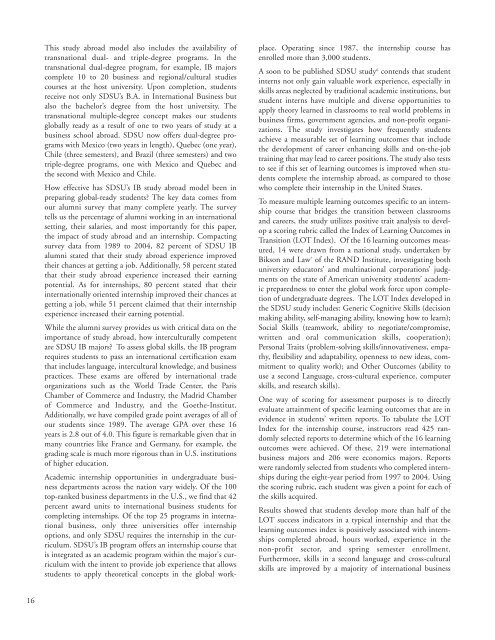Impact of Education Abroad on Career Development, Vol I - AIFS
Impact of Education Abroad on Career Development, Vol I - AIFS
Impact of Education Abroad on Career Development, Vol I - AIFS
You also want an ePaper? Increase the reach of your titles
YUMPU automatically turns print PDFs into web optimized ePapers that Google loves.
This study abroad model also includes the availability <str<strong>on</strong>g>of</str<strong>on</strong>g>transnati<strong>on</strong>al dual- and triple-degree programs. In thetransnati<strong>on</strong>al dual-degree program, for example, IB majorscomplete 10 to 20 business and regi<strong>on</strong>al/cultural studiescourses at the host university. Up<strong>on</strong> completi<strong>on</strong>, studentsreceive not <strong>on</strong>ly SDSU’s B.A. in Internati<strong>on</strong>al Business butalso the bachelor’s degree from the host university. Thetransnati<strong>on</strong>al multiple-degree c<strong>on</strong>cept makes our studentsglobally ready as a result <str<strong>on</strong>g>of</str<strong>on</strong>g> <strong>on</strong>e to two years <str<strong>on</strong>g>of</str<strong>on</strong>g> study at abusiness school abroad. SDSU now <str<strong>on</strong>g>of</str<strong>on</strong>g>fers dual-degree programswith Mexico (two years in length), Quebec (<strong>on</strong>e year),Chile (three semesters), and Brazil (three semesters) and twotriple-degree programs, <strong>on</strong>e with Mexico and Quebec andthe sec<strong>on</strong>d with Mexico and Chile.How effective has SDSU’s IB study abroad model been inpreparing global-ready students? The key data comes fromour alumni survey that many complete yearly. The surveytells us the percentage <str<strong>on</strong>g>of</str<strong>on</strong>g> alumni working in an internati<strong>on</strong>alsetting, their salaries, and most importantly for this paper,the impact <str<strong>on</strong>g>of</str<strong>on</strong>g> study abroad and an internship. Compactingsurvey data from 1989 to 2004, 82 percent <str<strong>on</strong>g>of</str<strong>on</strong>g> SDSU IBalumni stated that their study abroad experience improvedtheir chances at getting a job. Additi<strong>on</strong>ally, 58 percent statedthat their study abroad experience increased their earningpotential. As for internships, 80 percent stated that theirinternati<strong>on</strong>ally oriented internship improved their chances atgetting a job, while 51 percent claimed that their internshipexperience increased their earning potential.While the alumni survey provides us with critical data <strong>on</strong> theimportance <str<strong>on</strong>g>of</str<strong>on</strong>g> study abroad, how interculturally competentare SDSU IB majors? To assess global skills, the IB programrequires students to pass an internati<strong>on</strong>al certificati<strong>on</strong> examthat includes language, intercultural knowledge, and businesspractices. These exams are <str<strong>on</strong>g>of</str<strong>on</strong>g>fered by internati<strong>on</strong>al tradeorganizati<strong>on</strong>s such as the World Trade Center, the ParisChamber <str<strong>on</strong>g>of</str<strong>on</strong>g> Commerce and Industry, the Madrid Chamber<str<strong>on</strong>g>of</str<strong>on</strong>g> Commerce and Industry, and the Goethe-Institut.Additi<strong>on</strong>ally, we have compiled grade point averages <str<strong>on</strong>g>of</str<strong>on</strong>g> all <str<strong>on</strong>g>of</str<strong>on</strong>g>our students since 1989. The average GPA over these 16years is 2.8 out <str<strong>on</strong>g>of</str<strong>on</strong>g> 4.0. This figure is remarkable given that inmany countries like France and Germany, for example, thegrading scale is much more rigorous than in U.S. instituti<strong>on</strong>s<str<strong>on</strong>g>of</str<strong>on</strong>g> higher educati<strong>on</strong>.Academic internship opportunities in undergraduate businessdepartments across the nati<strong>on</strong> vary widely. Of the 100top-ranked business departments in the U.S., we find that 42percent award units to internati<strong>on</strong>al business students forcompleting internships. Of the top 25 programs in internati<strong>on</strong>albusiness, <strong>on</strong>ly three universities <str<strong>on</strong>g>of</str<strong>on</strong>g>fer internshipopti<strong>on</strong>s, and <strong>on</strong>ly SDSU requires the internship in the curriculum.SDSU’s IB program <str<strong>on</strong>g>of</str<strong>on</strong>g>fers an internship course thatis integrated as an academic program within the major's curriculumwith the intent to provide job experience that allowsstudents to apply theoretical c<strong>on</strong>cepts in the global workplace.Operating since 1987, the internship course hasenrolled more than 3,000 students.A so<strong>on</strong> to be published SDSU study 6 c<strong>on</strong>tends that studentinterns not <strong>on</strong>ly gain valuable work experience, especially inskills areas neglected by traditi<strong>on</strong>al academic instituti<strong>on</strong>s, butstudent interns have multiple and diverse opportunities toapply theory learned in classrooms to real world problems inbusiness firms, government agencies, and n<strong>on</strong>-pr<str<strong>on</strong>g>of</str<strong>on</strong>g>it organizati<strong>on</strong>s.The study investigates how frequently studentsachieve a measurable set <str<strong>on</strong>g>of</str<strong>on</strong>g> learning outcomes that includethe development <str<strong>on</strong>g>of</str<strong>on</strong>g> career enhancing skills and <strong>on</strong>-the-jobtraining that may lead to career positi<strong>on</strong>s. The study also teststo see if this set <str<strong>on</strong>g>of</str<strong>on</strong>g> learning outcomes is improved when studentscomplete the internship abroad, as compared to thosewho complete their internship in the United States.To measure multiple learning outcomes specific to an internshipcourse that bridges the transiti<strong>on</strong> between classroomsand careers, the study utilizes positive trait analysis to developa scoring rubric called the Index <str<strong>on</strong>g>of</str<strong>on</strong>g> Learning Outcomes inTransiti<strong>on</strong> (LOT Index). Of the 16 learning outcomes measured,14 were drawn from a nati<strong>on</strong>al study, undertaken byBiks<strong>on</strong> and Law 7 <str<strong>on</strong>g>of</str<strong>on</strong>g> the RAND Institute, investigating bothuniversity educators’ and multinati<strong>on</strong>al corporati<strong>on</strong>s’ judgments<strong>on</strong> the state <str<strong>on</strong>g>of</str<strong>on</strong>g> American university students’ academicpreparedness to enter the global work force up<strong>on</strong> completi<strong>on</strong><str<strong>on</strong>g>of</str<strong>on</strong>g> undergraduate degrees. The LOT Index developed inthe SDSU study includes: Generic Cognitive Skills (decisi<strong>on</strong>making ability, self-managing ability, knowing how to learn);Social Skills (teamwork, ability to negotiate/compromise,written and oral communicati<strong>on</strong> skills, cooperati<strong>on</strong>);Pers<strong>on</strong>al Traits (problem-solving skills/innovativeness, empathy,flexibility and adaptability, openness to new ideas, commitmentto quality work); and Other Outcomes (ability touse a sec<strong>on</strong>d Language, cross-cultural experience, computerskills, and research skills).One way <str<strong>on</strong>g>of</str<strong>on</strong>g> scoring for assessment purposes is to directlyevaluate attainment <str<strong>on</strong>g>of</str<strong>on</strong>g> specific learning outcomes that are inevidence in students’ written reports. To tabulate the LOTIndex for the internship course, instructors read 425 randomlyselected reports to determine which <str<strong>on</strong>g>of</str<strong>on</strong>g> the 16 learningoutcomes were achieved. Of these, 219 were internati<strong>on</strong>albusiness majors and 206 were ec<strong>on</strong>omics majors. Reportswere randomly selected from students who completed internshipsduring the eight-year period from 1997 to 2004. Usingthe scoring rubric, each student was given a point for each <str<strong>on</strong>g>of</str<strong>on</strong>g>the skills acquired.Results showed that students develop more than half <str<strong>on</strong>g>of</str<strong>on</strong>g> theLOT success indicators in a typical internship and that thelearning outcomes index is positively associated with internshipscompleted abroad, hours worked, experience in then<strong>on</strong>-pr<str<strong>on</strong>g>of</str<strong>on</strong>g>it sector, and spring semester enrollment.Furthermore, skills in a sec<strong>on</strong>d language and cross-culturalskills are improved by a majority <str<strong>on</strong>g>of</str<strong>on</strong>g> internati<strong>on</strong>al business16


